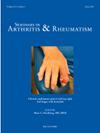癌症免疫疗法。
IF 4.6
2区 医学
Q1 RHEUMATOLOGY
引用次数: 0
摘要
免疫疗法使癌症的治疗发生了革命性的变化。然而,治疗抵抗和免疫介导的副作用降低了总体成功率。2024年《武器贸易条约》会议报告了这两个领域的最新发展。在此,我们讨论了免疫治疗耐药性依赖于癌细胞的免疫逃逸机制。细胞的恶性转化包括致癌基因的激活,引起细胞内信号转导的改变,称为“致癌信号”。在不同的血液系统恶性肿瘤中,如急性髓性白血病中的FLT3-ITD/ATF6/IL-15抑制轴,显示了致癌信号和免疫逃避机制之间的功能联系。第二个临床问题是癌症免疫治疗后免疫介导的副作用,因为它们会导致治疗中断,并可能因引入免疫抑制药物而丧失活性。抗pd -1免疫治疗引起的中枢神经系统炎症是罕见的,但有很高的发病率和死亡率。最近的研究表明,脾酪氨酸激酶(Syk)在小胶质细胞中的激活和下游信号传导介导抗pd -1免疫治疗诱导的中枢神经系统炎症。本文章由计算机程序翻译,如有差异,请以英文原文为准。
Immunotherapy in cancer
Immunotherapy has revolutionized the treatment of cancer. However, therapy resistance and immune mediated side effects reduce the overall success. Recent developments in these two areas were reported at the 2024 ATT conference. Here we discuss that immunotherapy resistance relies on immune escape mechanisms of cancer cells. Malignant conversion of a cell encompasses oncogene activation causing altered intracellular signal transduction termed “oncogenic signaling”. A functional connection between oncogenic signaling and immune evasion mechanisms was shown for different haematological malignancies such as the FLT3-ITD/ATF6/IL-15 inhibition axis in acute myeloid leukemia. A second clinical problem are Immune mediated side effects after cancer immunotherapy because they lead to treatment interruption and potentially loss of activity by introduction of immunosuppressive medication. Anti-PD-1 immunotherapy induced inflammation of the central nervous system is rare but has a high morbidity and mortality. Recent data show that spleen tyrosine kinase (Syk) activation and downstream signaling in microglia mediates anti-PD-1 immunotherapy induced inflammation of the central nervous system.
求助全文
通过发布文献求助,成功后即可免费获取论文全文。
去求助
来源期刊
CiteScore
9.20
自引率
4.00%
发文量
176
审稿时长
46 days
期刊介绍:
Seminars in Arthritis and Rheumatism provides access to the highest-quality clinical, therapeutic and translational research about arthritis, rheumatology and musculoskeletal disorders that affect the joints and connective tissue. Each bimonthly issue includes articles giving you the latest diagnostic criteria, consensus statements, systematic reviews and meta-analyses as well as clinical and translational research studies. Read this journal for the latest groundbreaking research and to gain insights from scientists and clinicians on the management and treatment of musculoskeletal and autoimmune rheumatologic diseases. The journal is of interest to rheumatologists, orthopedic surgeons, internal medicine physicians, immunologists and specialists in bone and mineral metabolism.

 求助内容:
求助内容: 应助结果提醒方式:
应助结果提醒方式:


